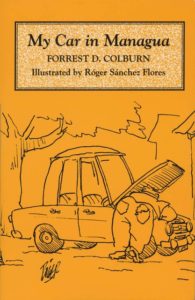
My Car in Managua
By Forrest D. Colburn
135 pages
Published in 1991 by University of Texas Press
My Car in Nicaragua was recommended by a friend and board member of FunLimon, our community development center in Nicaragua. It’s a small book, but it’s big on insights and observations about life in Nicaragua during the Sandinista revolution.
Forrest Colburn is an academic. This book is derived partly from dissertation work he did at Cornell on revolutionary Nicaragua. I expected it to be academic (dull & pompous). But it wasn’t. It was brilliant, insightful, and a pleasure to read. The approach to his subject and his prose is much closer to Bill Bryson than it is to Harold Bloom.
Except for the final chapter, Colburn’s thesis on the Sandinista revolution is told indirectly through anecdotes, many of which, as the title suggests, pertain to an old Fiat he bought while he was living there.
In one of many wonderful examples, he talks about the “adjustments” that a McDonald’s had to make:
McDonald’s Managua has responded to the difficulties with creativity and good humor. As one of McDonald’s managers explained, “When we don’t have yellow cheese, we use white cheese. When we don’t have lettuce, we use cabbage. And when we don’t have french fries, we sell deep-fried cassava.” Of course, there are occasional stopgap measures that do not work. For a while McDonald’s tried using Russian wrapping paper for its Big Macs. But by the time customers walked to their tables, the paper gave the Big Macs the odor of “wet cardboard.” The managers of McDonald’s Managua astutely quit using the wrapping paper.
Critical Reception
I couldn’t find any “official” reviews for this book, but here are a few excerpts of reviews posted by readers on GoodReads:
* “The affection that the author feels for this impoverished, exhausted country is obvious. For a commonsense view of 1980s Nicaragua that is enjoyable, well-written, and insightful, you cannot do better than this book.”
* “I’d read a much more political account of the Nicaraguan revolution before that showed what happened behind closed doors at the highest levels, but this shared sketches of a more personal nature, demonstrating how the revolution affected the day-to-day lives of normal people.”
* “Colburn is even-handed and remarkably non-judgmental: He notes the material shortages and inflation under the piecemeal socialism of the Sandinistas with the same disinterested clarity used when he describes the widespread jokes about former dictator Anastasio Somoza.”
 MarkFord
MarkFord